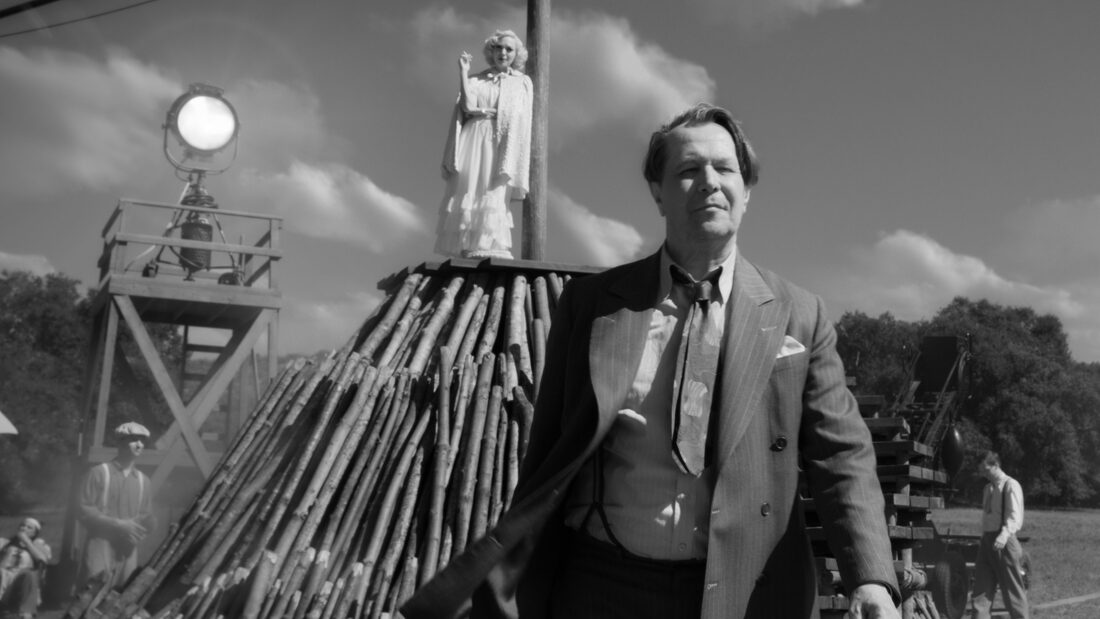I’m no scholar of mid-century Hollywood, but my immediate sense is that it’s an impersonal place that was incapable of letting unique vision get through its interlocking gates. Citizen Kane might be so highly praised because it thwarts those restraints, thanks to Welles being allowed by the gatekeepers to make whatever he wants. Mank isn’t about Welles’ own history being transported onto the screen, but about Mankiewicz’s. Citizen Kane is of course based on the life of William Randolph Hearts, and if Welles had no relationship with him, Mank certainly did. Hearst (Charles Dance) is something of a patron of Mank’s, shining down on him through RKO studio head Louis B. Mayer (Arliss Howard). In Fincher’s telling, it’s Hearst’s idea to subvert RKO with political ads against California gubernatorial candidate Upton Sinclair (Bill Nye in a fun cameo). Mank can’t stomach this betrayal of the medium, and uses it to put the poisoned exclamation point on Hearst’s life for future generations.
That’s a tidy telling of this story, but Fincher complicates events. Mank is an unsuitable truth-teller thanks to his drunkenness and one who also puts another patron of Hearst’s, Marion Davies (Amanda Seyfried), in the powerful man’s crosshairs thanks to Mank’s unsubtle creation of a Davies-equivalent character in his script. Seyfried is excellent as a bombshell with plenty of brassy dame inside of her, and ably splits the difference between the period setting and its modern release. Her side is that of not poking the bear that is Hearst, and she’s charismatic enough to make a good case for a bad end. At the same time, Hearst himself isn’t a figure of repulsiveness like Mayer often is. His salons are an attractive forum for honest debate and he’s not portrayed as high-handed as he easily could’ve been. Fincher allows the film to hate Hearst’s actions while making Hearst into a beneficent figure, and he does the opposite with Mank, a man who’ll speak truth to power while making an intoxicated fool of himself and ignoring his family, who, per Mank’s preference, live on the opposite coast far away from their husband and father.
Fincher’s generally more interested in finely detailed internal psychology than broad sweeps of political history, but Mank is as outwardly statement-driven as any of Fincher’s films. This is a lefty, romantic film made more pronounced by who it comes from, like three decades of non-statement filmmaking have been building to this. At the same time, strangely enough, the film’s firmest stance is a repudiation of blurring the lines between the cinema and agitprop. Mank, and Fincher by extension, is deeply offended by the idea of hiring actors and directors to make political ads, especially if the actors pretend to be real people, as they do in the anti-Sinclair commercials. For much of the film, I blurred the lines between what Mank was saying for Fincher, especially in a period of time when theaters are in economic danger. Betraying the sacred relationship between filmmakers and filmgoers is proclaimed as the greatest sin, something akin to what Hitler and Goebbels are doing across the Atlantic in a comparison that Mayer does not take kindly to.
If Hearst demands the greatest transgression be committed, it’s Mayer who comes off the worst. In one key past-set scene, Mank follows Mayer to a plea of the studio staff to accept a pay cut. The actors in the crowd buy their boss’s heartfelt proclamation that they’re a family and need to sacrifice together, but the technical crew roll their eyes. The various grips and craftsmen don’t need someone to yell ‘action’ to know when a performance is being given. The romantic version of Fincher is holding up the purity of cinema, and the cynical version is in these scenes, where everything out of Mayer’s mouth is a lie in service to his own ego or the interests of people ever more powerful than him. When Mank confronts Hearst, it’s Mayer that gets the most angry in Hearst’s defense, marking him as a con artist to those beneath him and a toady to those above. It’s not surprising that Fincher, or any single-minded director, would save his greatest disdain for a studio head.
The film being what it is, namely a insider-y slice of Hollywood arcana, the script can’t help but surrender to the kind of notes someone like Mayer would insist on. For the viewer not up on Citizen Kane or Welles lore, there are several of the ‘as you know’ kind of expositional asides that degrade the film’s illusion. Also, like fellow 2020 Oscar Best Picture aspirant Judas and the Black Messiah, the cast is too old for the roles, particularly Oldman. Mank spends the movie in his 30’s, but Oldman, in his early 60’s, never puts off the energy of a young man. He always comes off as the oldest person in the room, with Dance’s Hearst being the only exception. That he and Seyfried have a level of credible chemistry is a testament to both of their performances, as the visual of them together requires a lot of acting talent to get past. These flaws and the narrowness of the film, especially in comparison to Fincher’s other work, put Mank solidly in the middle of his filmography, a placing that would probably be lower if the film’s specific political points didn’t resonate as strongly as they do with this viewer. Fincher brings a certain level of expectation. Mank, with its strong acting and meticulous direction, doesn’t have the mysterious depth that is the other of Fincher’s distinctive qualities. B

 RSS Feed
RSS Feed